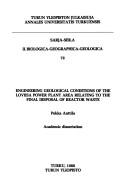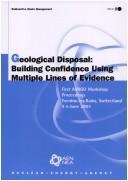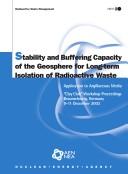| Listing 1 - 10 of 36 | << page >> |
Sort by
|

ISBN: 9518802033 Year: 1988 Volume: vol 72 Publisher: Turku Turun Yliopisto
Abstract | Keywords | Export | Availability | Bookmark
 Loading...
Loading...Choose an application
- Reference Manager
- EndNote
- RefWorks (Direct export to RefWorks)
Geology --- Radioactive waste disposal in the ground --- Dechets radioactifs --- Elimination dans le sol
Book
Year: 1982 Publisher: Paris : Nuclear Energy Agency, OECD,
Abstract | Keywords | Export | Availability | Bookmark
 Loading...
Loading...Choose an application
- Reference Manager
- EndNote
- RefWorks (Direct export to RefWorks)
Book
Year: 1981 Publisher: Paris : OCDE,
Abstract | Keywords | Export | Availability | Bookmark
 Loading...
Loading...Choose an application
- Reference Manager
- EndNote
- RefWorks (Direct export to RefWorks)
Radioactive waste disposal in the ground --- Déchets radioactifs --- Congresses --- Elimination dans le sol --- Congrès
Book
ISBN: 9789264060562 9264060561 9786612103285 1282103288 926406057X 9789264060579 Year: 2009 Publisher: Paris : OECD : Nuclear Energy Agency,
Abstract | Keywords | Export | Availability | Bookmark
 Loading...
Loading...Choose an application
- Reference Manager
- EndNote
- RefWorks (Direct export to RefWorks)
Geological settings selected as potential host formations for the deep geological disposal of radioactive waste are chosen for, among other assets, their long-term stability and buffering capacity against destabilising events and processes. These proceedings present the outcomes of a geosphere stability workshop, held in November 2007, that focused on crystalline and other types of hard, fractured rocks. The workshop underscored the fact that many such rocks are intrinsically stable environments that evolve extremely slowly and provide good buffering against external events and processes. The proceedings show a good understanding of the processes and events that can affect crystalline rocks and, although there is less confidence in predicting exactly when and where such events will occur and the volume of rock that will be affected, the extent of the impacts on a geological repository can be confidently addressed using bounding approaches supported by geological information from similar sites around the world.
Radioactive waste disposal in the ground --- Radioactive waste disposal --- Déchets radioactifs --- Congresses --- Elimination dans le sol --- Congrès --- Elimination

ISBN: 9264015922 9786610171644 1280171642 9264015930 9789264015937 Year: 2004 Publisher: Paris : OECD Publishing,
Abstract | Keywords | Export | Availability | Bookmark
 Loading...
Loading...Choose an application
- Reference Manager
- EndNote
- RefWorks (Direct export to RefWorks)
When preparing the safety case for a deep geological repository of radioactive waste, the integration of wide-ranging information from multidisciplinary sources is a complex task. This has provided the motivation for establishing AMIGO, an OECD/NEA international project on “Approaches and Methods for Integrating Geological Information in the Safety Case”. AMIGO is structured as a series of biannual topical workshops involving site characterisation and safety assessment practitioners with experience in both sedimentary and crystalline rock settings. The first AMIGO workshop was organised in Yverdon-les-Bains, Switzerland on 3-5 June 2003. The main objective of the workshop was to exchange views on building confidence in analyses and arguments that support the safety case using multiple lines of evidence and integrating the work of geoscientists and safety assessors. These proceedings present the outcomes of this workshop.
Radioactive waste disposal in the ground --- Déchets radioactifs --- Congresses. --- Elimination dans le sol --- Congrès --- Switzerland
Book
ISBN: 926417124X Year: 1999 Publisher: Paris : Organisation for Economic Co-operation and Development,
Abstract | Keywords | Export | Availability | Bookmark
 Loading...
Loading...Choose an application
- Reference Manager
- EndNote
- RefWorks (Direct export to RefWorks)
Radioactive waste disposal in the ground --- Radioisotopes --- Déchets radioactifs --- Isotopes radioactifs --- Congresses --- Migration --- Elimination dans le sol --- Congrès
Book
ISBN: 2951010850 Year: 2003 Publisher: Châtenay-Malabry : ANDRA,
Abstract | Keywords | Export | Availability | Bookmark
 Loading...
Loading...Choose an application
- Reference Manager
- EndNote
- RefWorks (Direct export to RefWorks)

ISBN: 9264009086 9786610356423 1280356421 9264009094 Year: 2004 Volume: 5303 Publisher: Paris, France : Nuclear Energy Agency, Organisation for Economic Co-operation and Development,
Abstract | Keywords | Export | Availability | Bookmark
 Loading...
Loading...Choose an application
- Reference Manager
- EndNote
- RefWorks (Direct export to RefWorks)
Most experts worldwide agree that radioactive waste disposal in engineered facilities, or repositories, located in appropriate formations deep underground, provide a suitable waste management option for protecting humans and the environment now and in the future. These conference proceedings establish the scientific basis for stability and buffering capacity of deep geological waste management systems. The proceedings synthesise the main outcomes of the workshop and present a compilation of the related abstracts.
Radioactive waste disposal in the ground --- Radioactive waste disposal --- Déchets radioactifs --- Congresses. --- Elimination dans le sol --- Congrès --- Elimination --- Germany
Book
ISBN: 9264142258 Year: 1994 Publisher: Paris : Organisation for Economic Co-operation and Development,
Abstract | Keywords | Export | Availability | Bookmark
 Loading...
Loading...Choose an application
- Reference Manager
- EndNote
- RefWorks (Direct export to RefWorks)
Groundwater flow --- Radioactive waste disposal in the ground --- Eau souterraine --- Déchets radioactifs --- Congresses. --- Experiments --- Congresses --- Ecoulement --- Congrès --- Elimination dans le sol --- Expériences --- International Stripa Project
Book
ISBN: 9282532178 9282532194 Year: 1982 Publisher: Luxembourg : Commission of the European Communities,
Abstract | Keywords | Export | Availability | Bookmark
 Loading...
Loading...Choose an application
- Reference Manager
- EndNote
- RefWorks (Direct export to RefWorks)
| Listing 1 - 10 of 36 | << page >> |
Sort by
|

 Search
Search Feedback
Feedback About UniCat
About UniCat  Help
Help News
News